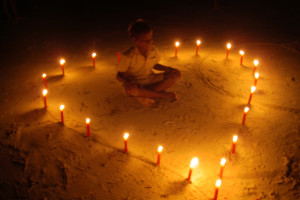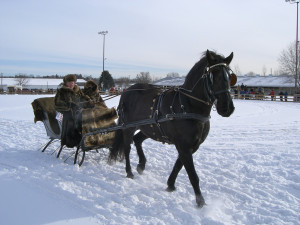Hope
January 1, 2019January 2019
In a time of destruction, create something. —Maxine Hong Kingston
Articles
When Hope and History Rhyme
Rev. Rachel LonbergMartin Luther King Jr. and other leaders were rather demoralized that spring of 1963. They had started a campaign to end segregation in Birmingham, Alabama and it wasn’t going well. Read more »
The Good News of Hopelessness
Rev. Joanna Fontaine CrawfordHope is tightly woven into Unitarian Universalism. The doctrine of universal salvation was referred to as “The Larger Hope.” Read more »
The Reason Why
BrandonFor the longest time I found myself living life in despair. I felt that I had little to live for, and had not only contemplated, but also attempted, suicide several times between the ages of 14 and 26. Read more »
An Airplane That Never Lands
John C.Being in prison is like being dead. Nothing matters. People fall out of your life; the world passes you by and forgets about you. Read more »
When Hope is Hard to Find
Rev. Monica DobbinsHow can we find hope in circumstances such as these we live in today? Would it help to ask what it is we are even looking for? Read more »
From Your Minister
Rev. Meg RileyI believe that the CLF mission statement is a recipe for hope: We seek to cultivate wonder, imagination, and the courage to act. Read more »
REsources for Living
Rev. Dr. Lynn UngarIn what is surely the most famous English-language description of hope, Emily Dickinson declares that… Read more »
Audio Resources
Quest for MeaningYou can listen to audio recordings of Quest Monthly, read back issues or get electronic versions of the text to share with friends (and much more) at questformeaning.org Read more »
Freedom Ridge
JohnOutside my window, past the razor wire and fence, lies a ridge. A quartet of blue jays and a woodpecker live in the scrub oaks on the left. Read more »
Thank You
Quest for MeaningEnormous thanks to the following congregations and organizations, which generously contributed to the CLF between April and August 2018. We are so grateful! Read more »
The Blessed Gift of Joy
July 6, 2016Siri Allison is a storyteller with Story Circle at Proctors, the resident storytelling company at this performing arts center in Schenectady, NY. This story is from the Kanglanek people, who live near the source of the Colville River, a major river on the Arctic Coast of Alaska. (Story begins at 1:20 after some introduction.)
Send in the Clowns
July 6, 2016Most of us only see clowns in parades and circuses. But for refugees and people who cannot go back to their homes, there are not many parades or circuses, and the children who live in the refugee communities don’t get to see many clowns-or have a lot of fun in general. It’s a hard life for anyone, especially for children, but these clowns are clowning for a cause!
Clowns without Borders is a troupe of performers who visit refugee camps and displaced communities and perform for them. They juggle, they do magic tricks, they make everyone laugh and smile. For more than 20 years, these joyful folks have brought joy to the loves of people who have experienced great struggles and loss. They call it Resilience Through Laughter.
Why is this posted in the UU & You section of Family Quest? Because there are UUs participating in Clown Without Borders today! Here’s an interview with lifelong Unitarian Universalist Sarah Foster:
Sarah Liane Foster, a lifelong Unitarian Universalist, traveled as a professional clown with Clowns Without Borders to Haiti, Turkey, Colombia, Swaziland, and South Africa where children have experienced conflict and injustice. “Laughter is a critical way to heal trauma,” Sarah said. You can read more about Sarah’s story in the Spring 2016 Family pages of UU World as well!
Whole, Not Broken
March 1, 2016Christopher Reeve had everything going for him. He was handsome and athletic and famous for playing Superman in the movies. He had a lovely family and plenty of money that he’d made as a movie star. Really, things could hardly have been better.
Until he was in a horse bock riding accident that damaged his spine and left him paralyzed below his neck. He couldn’t move his hands or feet, let alone play a superhero who could jump tall buildings in a single bound. He was, in a profound way, broken.
But in many other ways, he was deeply whole. He had a family who loved him and believed in him. And he found in his Unitarian Universalism a reminder that one way we can build wholeness for ourselves is by doing what we can to build wholeness for others.
So Christopher and his wife Dana dedicated themselves to trying to make life better for other people who had spinal cord injuries. They raised money to help people get things they needed like ramps and vans that could carry wheelchairs. And they raised money for research that might help people with spinal cord injuries.
Christopher Reeve eventually died from the complications of living with his injury, but his living taught a lot of people about what can be whole when things get broken.
Hopes for the Day
December 1, 2015Setting intentions is a way of practicing mindfulness by focusing on the kind of day, week, year or life you’d like to have, and visualizing the actions you can take to achieve your hopes. It’s a practice that can work for adults, teens and children alike.
If you have time as a family to gather in the morning, take turns sharing your intentions for the day. You could even light a candle or write down your intentions together on a chalkboard or paper, or construct a family ritual of your own. (If time in the morning is stretched thin, you could also take time during the evening or bedtime the night before.)
Children will likely need some help learning this new practice. A good question to begin with is, “What good do you want to invite into your life today?” You can suggest some general feelings that a child might understand and hope to experience: love, peace, joy, fun, safety and success are all good starters.
Brainstorm with children to come up with concrete ways they could experience these feelings during the day, such as “I want to invite success into my life by acing my math test,” or “I want to experience fun by playing with my friends at recess, or “I want to invite peace into my world by talking to kids at school that look lonely.” Yoga Chicago offers some other great suggestions for setting intentions with children that apply well for all ages.
Lastly, visualize these things happening: sitting down to take the math test and knowing all the answers, being a good friend to classmates so that you can enjoy fun together at recess, being mindful of which classmates could use a friendly ear, and striking up conversation. (Visualizing your hopes for the day is also a great meditative exercise for adults, too!)
For additional ideas for setting intentions for yourself or for your family, visit Playful Planet’s website.
A Legacy of Hope
December 1, 2015Why, you might ask, would we honor James Lord Pierpont? James, who was born in 1822, grew up a Unitarian, but it was his father John who was the minister. John was also an abolitionist, someone who fought against slavery. But James actually fought on the side of the South during the Civil War.
James married and had children, but he left them behind to start a business as part of the California Gold Rush. His business failed after his goods burned up in a fire. A few years later his wife died, and James left his kids with his father as he followed his brother Rev. John Pierpont, Jr. to Savannah, Georgia, where the younger John Pierpont was called to serve a Unitarian church.
So what about this makes James Pierpont so special? Nothing. It was a lot of failure and sadness. Except that somewhere around the time that he moved to Savannah, James wrote a little song you might have heard. He called it “The One Horse Open Sleigh,” but you might know it as “Jingle Bells.”
When he was going through trouble and loss, James Pierpont could have no idea that he would create something that 150 years later would be part of the joyful holiday season for millions of children and adults. That’s hope for you.
At the Intersection of Despair and Love
December 1, 2015Podcast: Download (Duration: 12:05 — 5.5MB)
Subscribe: More
My connection with the Unitarian Universalist Trauma Response Ministry began September 26, 2001. It was just fifteen days after the perilous events in New York City, Washington, DC, and western Pennsylvania. Read more →
The Hope of Our Ancestors
December 1, 2015Podcast: Download (Duration: 16:44 — 15.3MB)
Subscribe: More
 This piece was originally presented at a #BlackLivesMatter vigil at the First Universalist Church of Minneapolis.
This piece was originally presented at a #BlackLivesMatter vigil at the First Universalist Church of Minneapolis.
My heart is aching for answers, for a way this makes sense, for a way to understand a 12-year old child shot, a way to understand Eric Garner, a father of six, choked to death in broad daylight with his murderers caught on camera—no medical attention, left to die in the street just like Michael Brown, who also received no medical attention. Read more →
Support the CLF
Can you give $5 or more to sustain the ministries of the Church of the Larger Fellowship?
If preferred, you can text amount to give to 84-321
Newsletter Signup
About
Quest for Meaning is a program of the Church of the Larger Fellowship (CLF).
As a Unitarian Universalist congregation with no geographical boundary, the CLF creates global spiritual community, rooted in profound love, which cultivates wonder, imagination, and the courage to act.
Contact
Church of the Larger Fellowship Unitarian Universalist (CLFUU)
24 Farnsworth Street
Boston MA 02210





